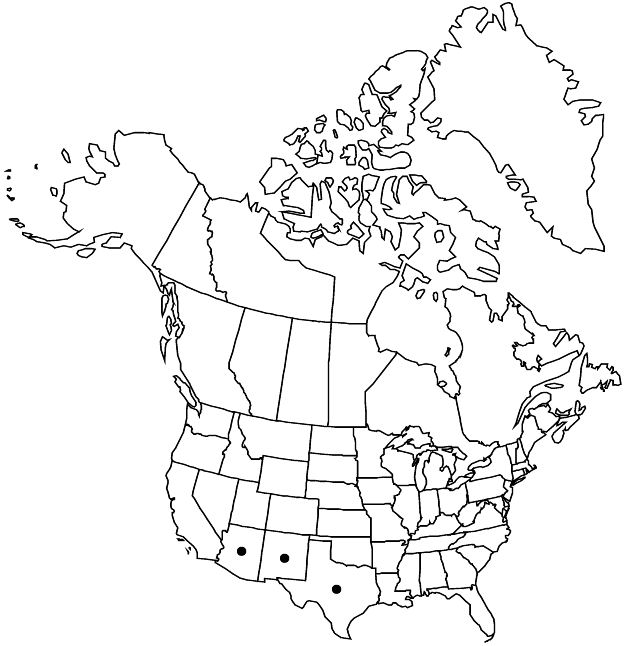Difference between revisions of "Phoradendron capitellatum"
Phoradendron, 25, plate 17. 1916.
FNA>Volume Importer |
imported>Volume Importer |
||
| (6 intermediate revisions by 2 users not shown) | |||
| Line 12: | Line 12: | ||
|name=Phoradendron bolleanum var. capitellatum | |name=Phoradendron bolleanum var. capitellatum | ||
|authority=(Torrey ex Trelease) Kearney & Peebles | |authority=(Torrey ex Trelease) Kearney & Peebles | ||
| + | |rank=variety | ||
}} | }} | ||
|hierarchy=Viscaceae;Phoradendron;Phoradendron capitellatum | |hierarchy=Viscaceae;Phoradendron;Phoradendron capitellatum | ||
| Line 27: | Line 28: | ||
|elevation=1000–2000 m. | |elevation=1000–2000 m. | ||
|distribution=Ariz.;N.Mex.;Tex.;Mexico (Chihuahua;Sonora). | |distribution=Ariz.;N.Mex.;Tex.;Mexico (Chihuahua;Sonora). | ||
| − | |discussion=<p>Phoradendron capitellatum is parasitic exclusively on Juniperus (for example, J. monosperma, J. osteosperma, and J. pinchotii). This species has sometimes been classified as a subspecies of P. bolleanum; however, it differs in flowering time, basal phyllotaxy, stellate pubescence, and inflorescences sometimes with more than one fertile internode. These two species, along with P. juniperinum, were supported as monophyletic using molecular data, although relationships among them were not fully resolved (V. E. T. M. Ashworth 2000). These parasites of conifers were all classified in sect. Pauciflorae Engler in the sense of D. Wiens (1964).</p> | + | |discussion=<p><i>Phoradendron capitellatum</i> is parasitic exclusively on <i>Juniperus</i> (for example, <i>J. monosperma</i>, <i>J. osteosperma</i>, and <i>J. pinchotii</i>). This species has sometimes been classified as a subspecies of <i>P. bolleanum</i>; however, it differs in flowering time, basal phyllotaxy, stellate pubescence, and inflorescences sometimes with more than one fertile internode. These two species, along with <i>P. juniperinum</i>, were supported as monophyletic using molecular data, although relationships among them were not fully resolved (V. E. T. M. Ashworth 2000). These parasites of conifers were all classified in sect. Pauciflorae Engler in the sense of D. Wiens (1964).</p> |
|tables= | |tables= | ||
|references= | |references= | ||
| Line 36: | Line 37: | ||
-->{{#Taxon: | -->{{#Taxon: | ||
name=Phoradendron capitellatum | name=Phoradendron capitellatum | ||
| − | |||
|authority=Torrey ex Trelease | |authority=Torrey ex Trelease | ||
|rank=species | |rank=species | ||
| Line 51: | Line 51: | ||
|publication year=1916 | |publication year=1916 | ||
|special status= | |special status= | ||
| − | |source xml=https:// | + | |source xml=https://bitbucket.org/aafc-mbb/fna-data-curation/src/2e0870ddd59836b60bcf96646a41e87ea5a5943a/coarse_grained_fna_xml/V12/V12_315.xml |
|genus=Phoradendron | |genus=Phoradendron | ||
|species=Phoradendron capitellatum | |species=Phoradendron capitellatum | ||
Latest revision as of 19:14, 5 November 2020
Subshrubs, erect but pendulous with age, 3–6 dm, dioecious. Stems green, densely hairy, hairs stellate, fine, white; internodes terete, 5–15 × 1–2 mm. Leaves green, well developed; petiole indistinct; blade narrowly elliptic to spatulate or oblanceolate, 8–15 × 1–3 mm, fleshy, base cuneate, apex rounded or acute; basal phyllotaxy median. Staminate inflorescences 3–5 mm; peduncle with 1 internode, 0.5–2.5 mm; fertile internodes 1–2, each 6-flowered, seriation unknown, flowers 3 (2 proximal, 1 distal) per bract. Pistillate inflorescences 3–5 mm; peduncle with 1 internode, 0.5–2.5 mm; fertile internodes 1–2, each 2-flowered, flowers 1 per bract, deeply embedded in axis. Flowers: petals 3, 1 mm. Berries pinkish white, globose, 3.5 × 3.5 mm, glabrous. 2n = 28.
Phenology: Flowering winter.
Habitat: Juniper-pinyon woodlands.
Elevation: 1000–2000 m.
Distribution

Ariz., N.Mex., Tex., Mexico (Chihuahua, Sonora).
Discussion
Phoradendron capitellatum is parasitic exclusively on Juniperus (for example, J. monosperma, J. osteosperma, and J. pinchotii). This species has sometimes been classified as a subspecies of P. bolleanum; however, it differs in flowering time, basal phyllotaxy, stellate pubescence, and inflorescences sometimes with more than one fertile internode. These two species, along with P. juniperinum, were supported as monophyletic using molecular data, although relationships among them were not fully resolved (V. E. T. M. Ashworth 2000). These parasites of conifers were all classified in sect. Pauciflorae Engler in the sense of D. Wiens (1964).
Selected References
None.